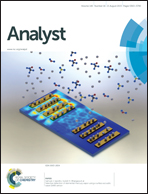Magnetic solid phase extraction coupled with desorption corona beam ionization-mass spectrometry for rapid analysis of antidepressants in human body fluids†
Abstract
Ambient ionization techniques show good potential in rapid analysis of target compounds. However, a direct application of these ambient ionization techniques for the determination of analytes in a complex matrix is difficult due to the matrix interference and ion suppression. To resolve this problem, here we developed a strategy by coupling magnetic solid phase extraction (MSPE) with desorption corona beam ionization (DCBI)-mass spectrometry (MS). As a proof of concept, the pyrrole-coated Fe3O4 magnetic nanoparticles (Fe3O4@Ppy) were prepared and used for the extraction of antidepressants. After extraction, the Fe3O4@Ppy with trapped antidepressants was then directly subjected to DCBI-MS analysis with the aid of a homemade magnetic glass capillary. As the MSPE process is rapid and the direct DCBI-MS analysis does not need solvent desorption or chromatographic separation processes, the overall analysis can be completed within 3 min. The proposed MSPE-DCBI-MS method was then successfully used to determine antidepressants in human urine and plasma. The calibration curves were obtained in the range of 0.005–0.5 μg mL−1 for urine and 0.02–1 μg mL−1 for plasma with reasonable linearity (R2 > 0.951). The limits of detection of three antidepressants were in the range of 0.2–1 ng mL−1 for urine and 2–5 ng mL−1 for plasma. Acceptable reproducibility for rapid analysis was achieved with relative standard deviations less than 19.1% and the relative recoveries were 85.2–118.7%. Taken together, the developed MSPE-DCBI-MS strategy offers a powerful capacity for rapid analysis of target compounds in a complex matrix, which would greatly expand the applications of ambient ionization techniques with plentiful magnetic sorbents.


 Please wait while we load your content...
Please wait while we load your content...